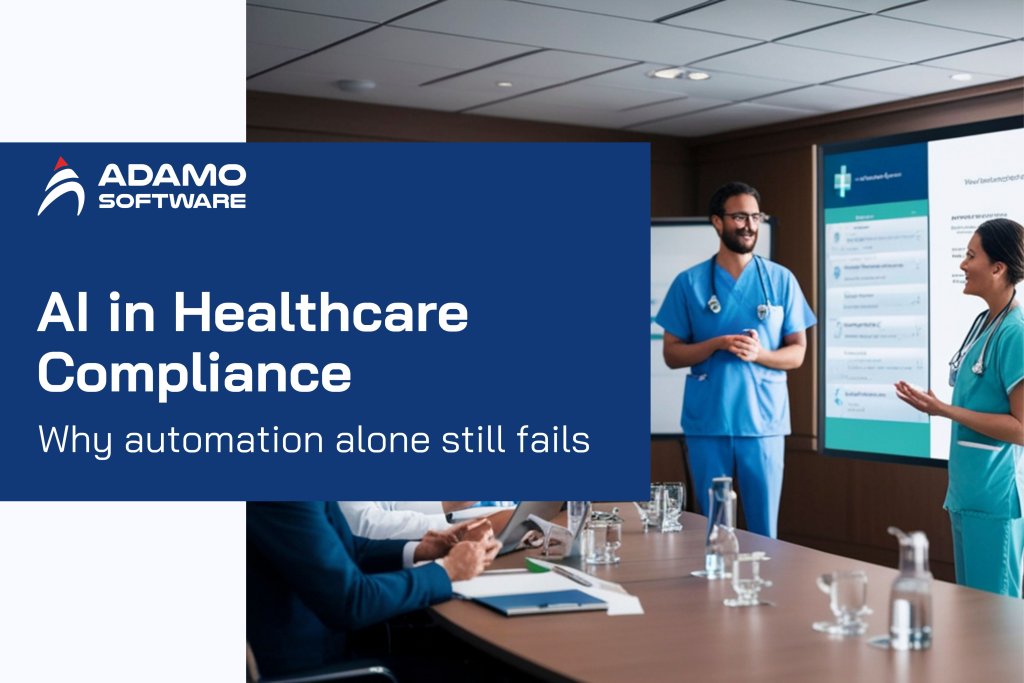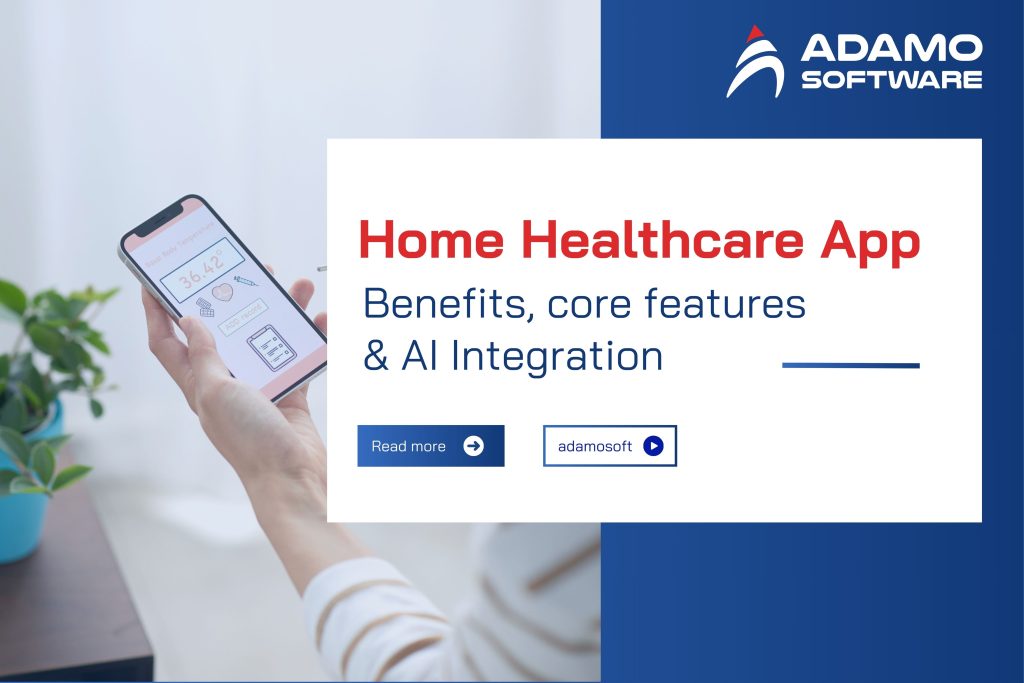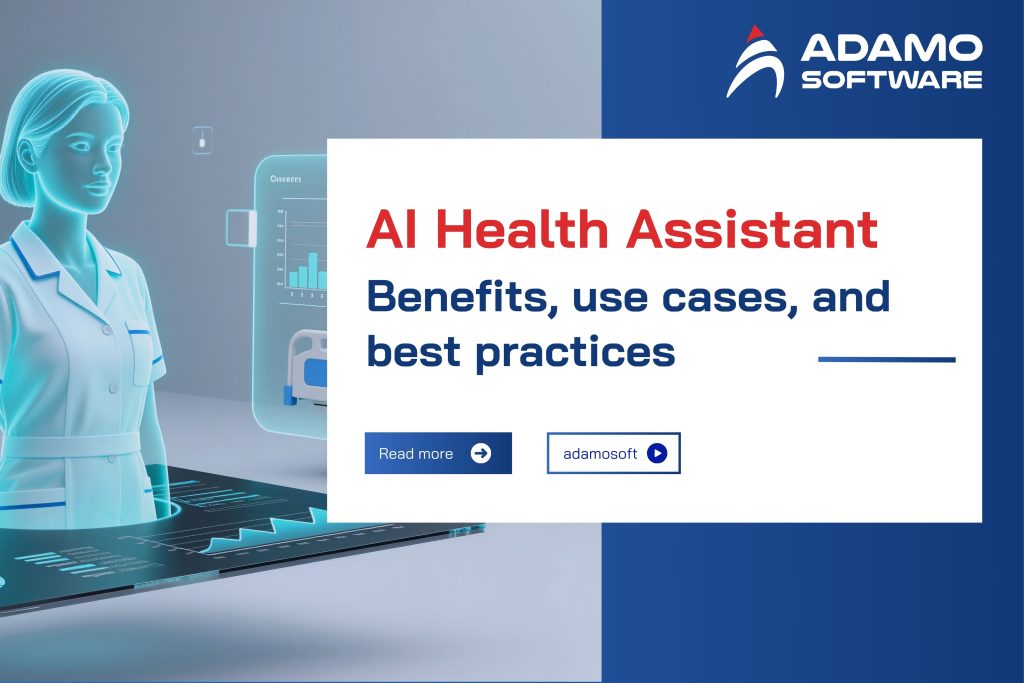What is a mHealth app? Market overview, benefits and current trends
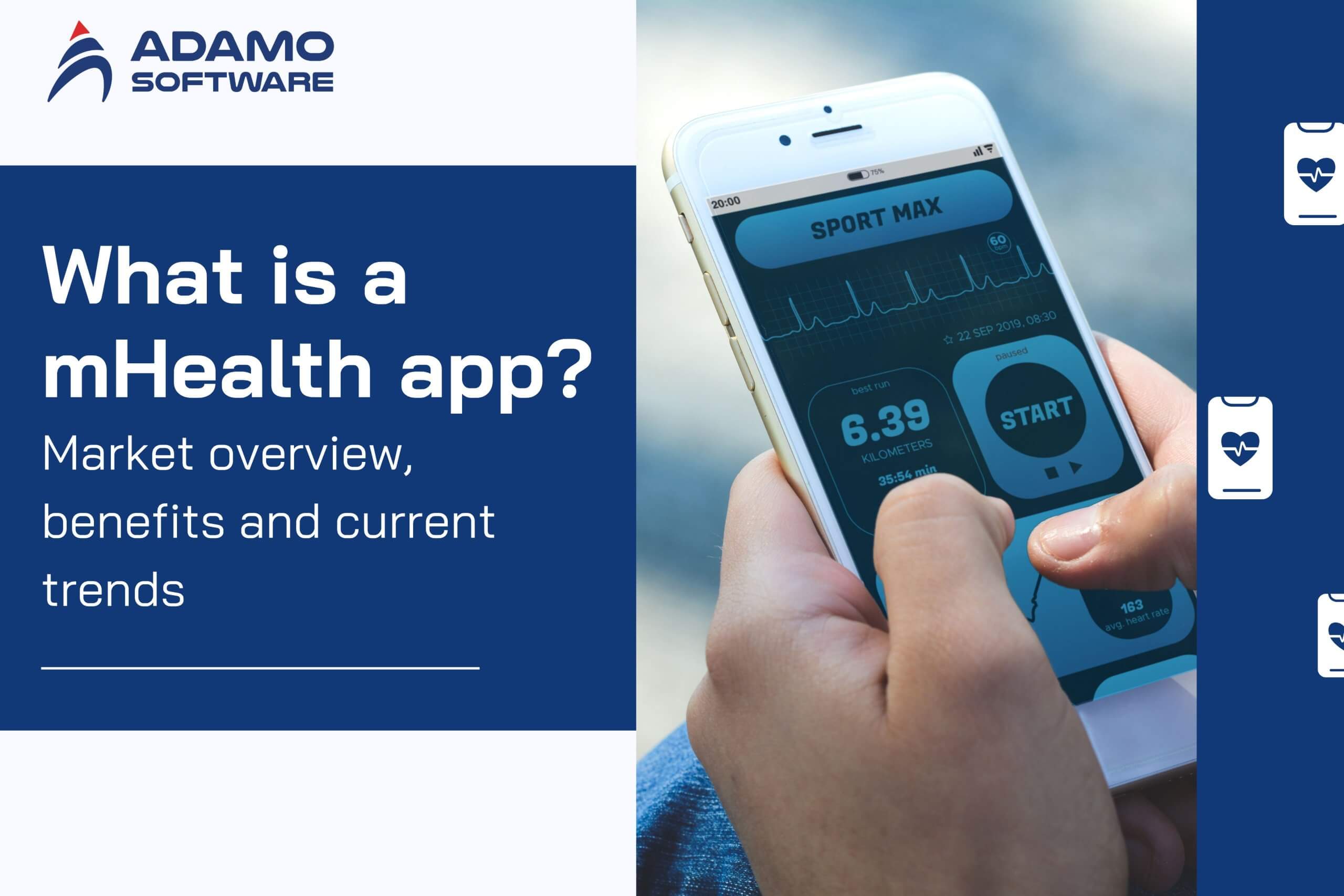
The future of health is influenced significantly by current advances in information technology. mHealth is part of this change. And understanding what is a mHealth app is crucial. It delivers healthcare through mobile phones. You can define it as an application that assists individuals in managing their health. You can also monitor or keep track of it through a mobile device. Such apps help provide patients with closer healthcare since they can access solutions easily.
The market for mHealth apps has expanded rapidly as they make efficiency in providing healthcare products and services achievable. Pediatrics-based features include teleconsultations, fitness tracking, and medication reminders. They are how the App is revolutionizing the way patients relate with doctors. This allows us to appreciate how mHealth apps engage, inform, and support convenient self-management of health by individuals.
The market overview, the advantages of such apps, and the current trend analyzing the further development of such applications will be discussed in this article. Whether you want to know more about those creative tools, or you want to find experts to work with for more development, this guide has got you covered. At the end of the article, you will get the answer to what is a mHealth app. You will also know why it is critically important in today’s world.
I. What is a mHealth app?
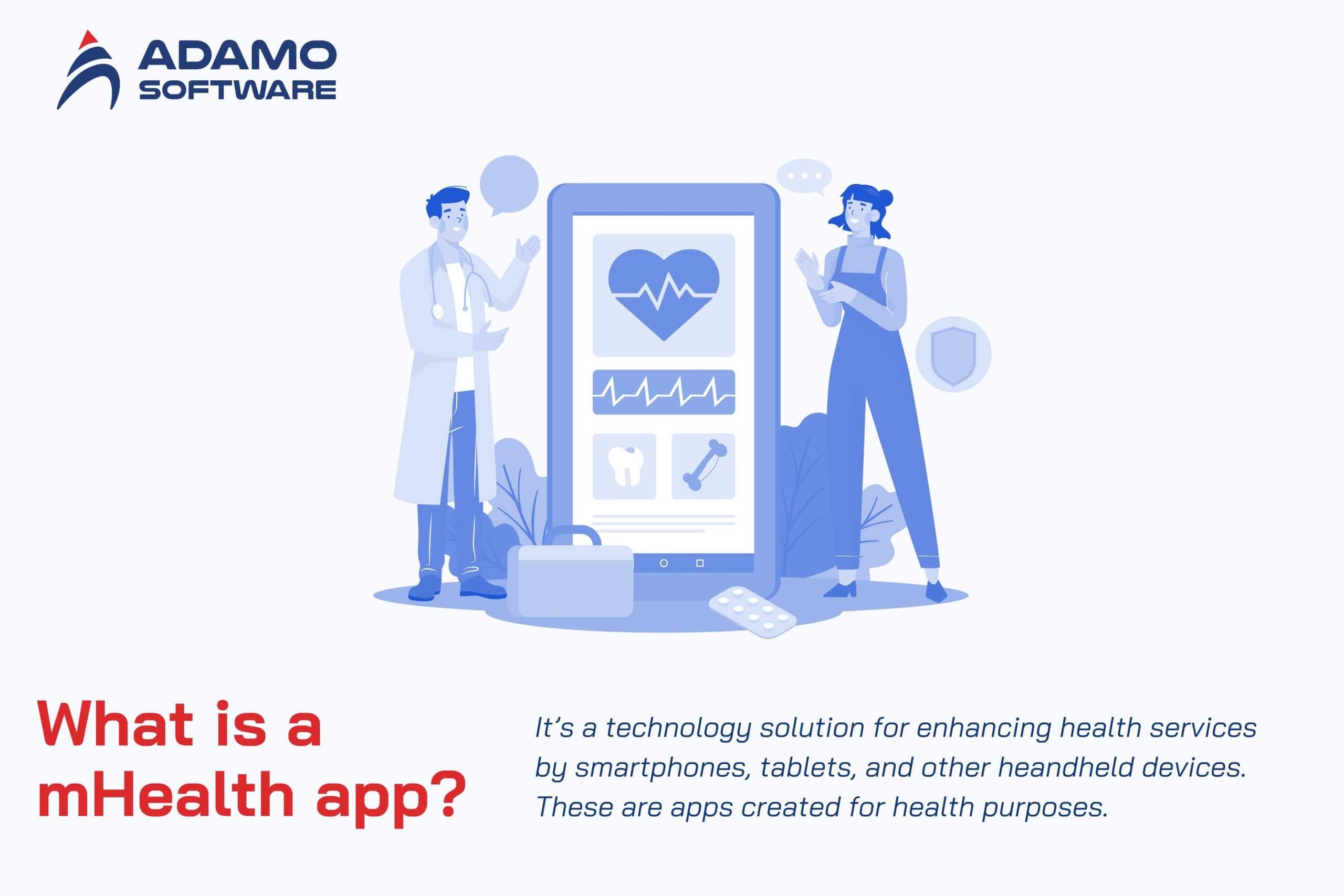
To understand the growing importance of healthcare technology, it’s essential to ask: What is a mHealth app? About mHealth app mHealth app means mobile health application, a technology solution for enhancing health services by smartphones, tablets, and other handheld devices. These are applications created for health purposes. They include tracking exercise, disease, medication, or getting medical advice through the application. They join health care together with the virtue of technology. Thereby they make medical care easier than ever before.
The goal of mHealth apps is to transform client engagement with health delivery systems. Users no longer need to visit a clinic or hospital for simple issues. They can use healthcare tools to check up on their health, manage a disease, or prevent diseases at any given time.
For instance, mHealth apps can monitor your daily steps. They can also alert you to the need to take particular drugs or afford user consulting services through public health professional personnel.
In response to the question of what is a mHealth app, we explain its capabilities in reforming the healthcare system. These apps allow users to manage their health and provide relevant information and services at the tap of a button. For perusing health and fitness or chronic patients, mHealth apps bring personalized ways to enhance their health status.
All in all, mHealth apps link IT technology and several spheres of people’s lives. This makes life healthier without excessive effort and time consumption. Realizing what is a mHealth app will give us a clearer vision of how these instruments are framing the future of medicine.
II. MHealth app market: Statistics included
The mHealth app industry is one of the most rapidly growing segments in the mobile environment. However, by benchmarking the present and the future, one can understand just how large this industry is. We will also review mHealth app so that the reader will comprehend why it is central to these healthcare innovations.
1. Rapid Growth of the mHealth App Market
mHealth app usage has rapidly expanded in the last few years and is a global market. Market size in 2022, it will be worth more than $50 billion. It is expected to grow to approximately $250 billion by 2030, demonstrating a CAGR greater than 25%. This explains why mHealth solutions are so sought after in today’s society.
2. A Wide Range of mHealth Apps Available
Published mHealth apps for all these purposes are diverse and plentiful. As of now, there are over 350,000 mHealth apps that are for download mostly in the various app stores. The most requested and common uses for types of mHealth apps are workout or activity tracking, mood/stress control, and disease-specific apps.
3. Smartphone Penetration Driving Growth
The number of smartphone consumers will cross over 7.6 billion by 2027, which means that mHealth apps will continue to grow at a faster rate. More than 6 in 10 smartphone users have already installed one or multiple mHealth applications. This underlines those tools’ importance in people’s lives.
4. The Impact of the COVID-19 Pandemic
The pandemic helped expedite the use of mHealth apps because people could receive consultations and track their health from afar. This shift focuses on defining mHealth. More specifically, it defines what is a mHealth app and how it helps fill gaps in care access.
5. Investment in Digital Health Tools
Digitalization activities are increasing in governments’ and healthcare entities’ expenditures. According to statistics for 2023 investment in mHealth and other associated tools was over $60 billion. This proves the trend to develop these types of technologies.
6. User Engagement and Effectiveness
Research shows that those who use mHealth apps can get to where they want to be health-wise, 20% more than people who do not use them. This underscores the potential mHealth apps have as tools for leading to enhanced health.
7. Outlook of mHealth Apps
The market trend above shows that mHealth apps are set to revolutionize the healthcare sector. To appreciate what is a mHealth app, it is important to understand how it can revolutionize the delivery, accessibility, and targeted approach to care delivery.
That is why it is crucial to provide an understanding of what is a mHealth app depending on the existing market statistics. From the above description, this is a technology that is changing the face of healthcare, bringing it to millions of people around the world in a personalized, and effective manner.
III. Significant advantages of mHealth apps
Knowing what is a mHealth app, is not enough. There is so much more to know. These apps offer distinct advantages and meaningful value to patients and healthcare service personnel. In doing so, they are modernizing health care by making it more efficient and patient-centric by presenting new approaches. Below are some of the main benefits that can explain why mHealth applications are already considered an important component of today’s healthcare.
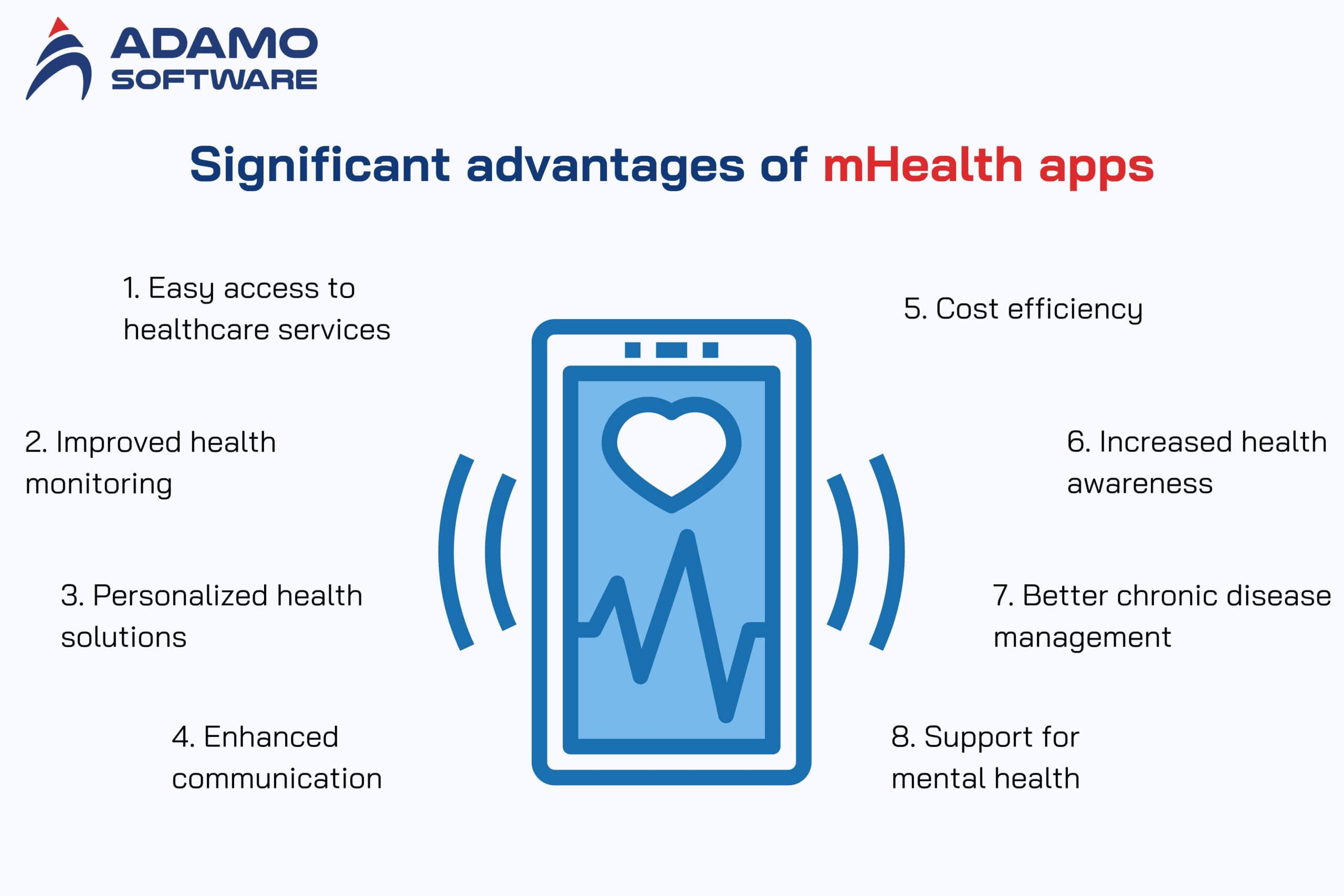
1. Easy Access to Healthcare Services
mHealth apps help make healthcare accessible, with just a click of a button. Clients can schedule a visit, speak to a physician, and even review their files without going to a clinic. As to what is a mHealth app, it is an application that makes care accessible at any time and in any place. This proves very useful, especially to those who may live in regions not served well by a doctor.
2. Improved Health Monitoring
This paper notes that mHealth apps help users monitor their health in real-time. They are useful for health tracking. They can record pulse, blood pressure, glucose level, and many other things, which patients with chronic diseases require to keep track of. A mHealth app enables an understanding of how these assistive tools help users to stay informed regarding their state of health.
3. Personalized Health Solutions
Another advantage of the mHealth apps is that they can deliver customized care. According to the users, custom mHealth app development offers recommendations on health, diet and exercise, and prescriptions. This enables meeting the general health goals of the users and also responding to the question. What is a mHealth app concerning the individualization of healthcare?
4. Enhanced Communication
mHealth apps enhance compliance with appointments with doctors and other caregivers for patients. Functions such as video, telephone consultation, and follow-up alerts guarantee that patients get recommendations at the right time. In healthcare providers, it translates into improved interface with their patients and tracking of their outcomes.
5. Cost Efficiency
mHealth apps are greatly effective in coping with health costs since they help avoid clinic visits and admissions. For instance, a lot of time and money is shaved off by having teleconsultations through any of these apps. Due to this understanding, users of the definitions of what is a mHealth app, know how these tools make healthcare cheaper yet effective.
6. Increased Health Awareness
Using the social media provided by these apps, the users can inform themselves about their health status and get access to accurate medical data. It gives people dietary advice, diet plans, and even symptom checkers, keeping people informed. Knowing what is a mHealth app demonstrates how it assists people to make better choices regarding their health.
7. Better Chronic Disease Management
Treating length Other’ chronic illnesses such as diabetes, hypertension, asthma, and the like are more manageable with the help of mHealth apps. These applications often work as an alarm to take medications on time, record the symptoms, and organize the physician’s appointments. Knowing what is a mHealth app helps one understand that it can go a long way to enhance the lives of patients with chronic diseases.
8. Support for Mental Health
Mental health is also being targeted by mHealth apps through them offering therapy sessions, techniques for managing stress, and mindfulness. They make a point of providing easily accessible mental health by staying reachable through home visits. This is another way of looking at what is a mHealth app and the benefits of having one.
Pros of mHealth apps provide clear evidence of the ability of these applications to tremendously transform future healthcare. Starting with the possibility of accessing it and up to cost aspects of using it – all these tools are useful for users and contribute to developing medical services. As more and more people go through what is a mHealth app, the matter is, that mHealth apps are leading to a healthier, interconnected future.
IV. Current trends in mHealth apps
The application of mobile technologies in healthcare facilities is a dynamic subject with fresh discoveries being developed all the time. When considering the future of healthcare, we should also take some time to define what is a mHealth app. These are no longer just health monitoring applications. We shape how healthcare is offered. Below are the trends prevailing in the current scenario related to the mHealth app.
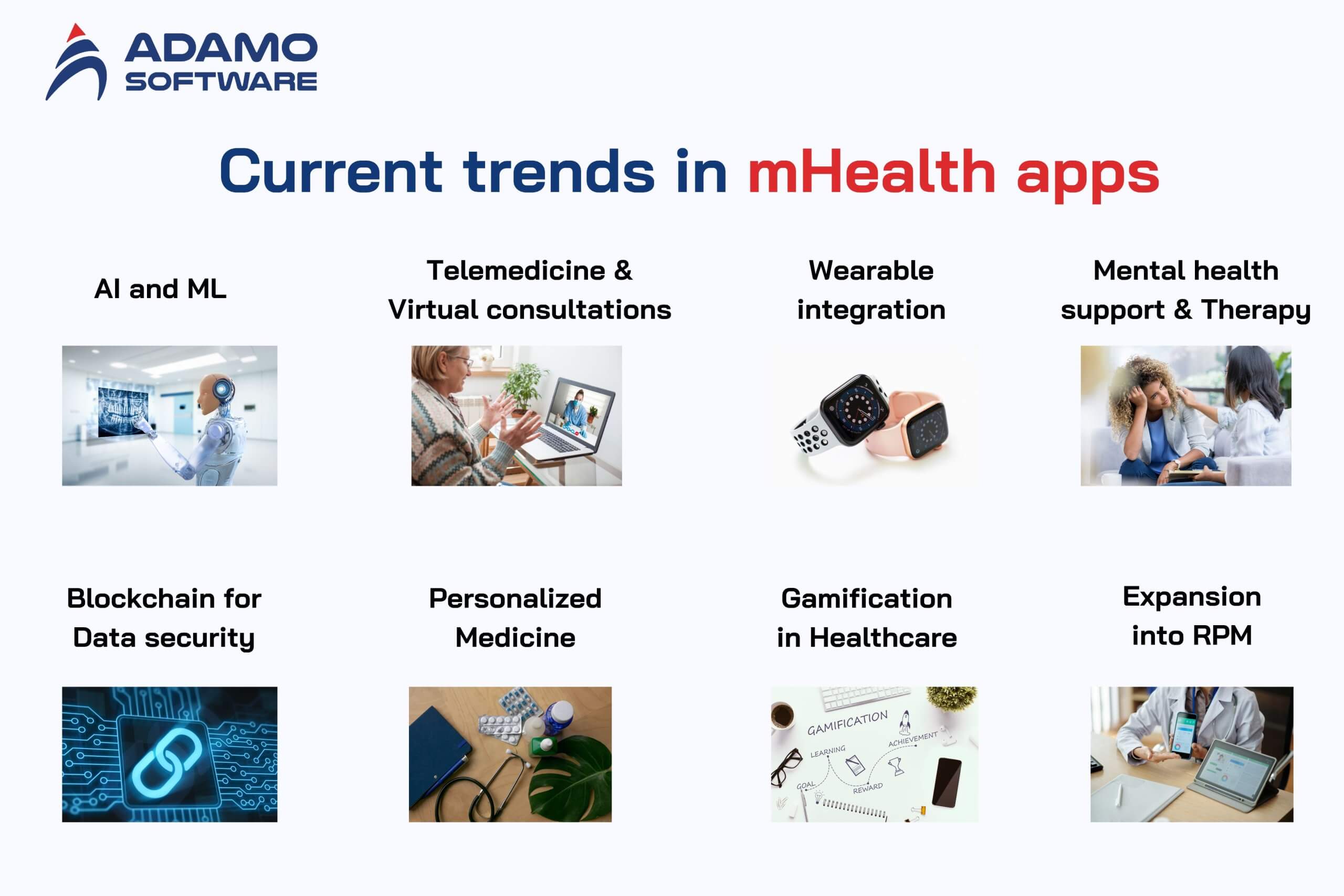
1. Growing Focus on AI and Machine Learning
In this research, the authors investigate the effects that Artificial Intelligence (AI) and Machine Learning (ML) have on mHealth apps. These technologies help to offer statistics for forecasting, offering recommendations, and diagnostic performance. For Instance, using AI in apps, data from users can be analyzed to establish signs of developing ailments. When detected, this will trigger an alert. This trend shows that in addition to characterizing mHealth, what is a mHealth app also incorporates smarter functions that improve health care delivery.
2. Telemedicine and Virtual Consultations
Telemedicine has been a key part of the mHealth apps post the Covid situation. The advantage of such apps is that one can speak with a doctor without visiting him or her in person. This trend allows healthcare to reach out to anyone who cannot get to a clinic. Because they live in a rural area or cannot be bothered. Knowing what is a mHealth app, we envision how these technologies are reducing the divide between consumers and doctors.
3. Wearable Integration
Wearable device compatibility is another emerging aspect noted in the context of mHealth apps. Smartphones are now perfectly compatible with trackers, smartwatches, and even biosensors. They are also fit with racking important parameters such as the heartbeat, a person’s sleep, and activity level. This blend delivers timely data to enhance health as an individual prompts him/her instantly about what is a mHealth app regarding empowering everyday wellness.
4. Mental Health Support and Therapy
Another trend for increasing use of mHealth apps is the attention to mental health. These apps now provide therapy sessions and guided meditation plus stress management tools and others. The ever-increasing demand for mental health services has made such functionalities or features compulsory. This is another face of a mHealth app.
5. Blockchain for Data Security
Since mHealth apps deal with personal health information they must always ensure data security. The technology of blockchain enables the sharing of data between users and healthcare providers while permitting higher security. This trend brings trust and reliability to mHealth apps. This explains why it is crucial to understand what is a mHealth app and how it safeguards users’ privacy.
6. Personalized Medicine
The targets for mHealth apps are beginning to tap into the customer’s data to make personalized services in the healthcare sector. From fitness programs to medication prescriptions, all these apps ensure that the client gets the right treatment. It is crucial to comprehend that a mHealth app is primarily designed to help provide patient-specific support for improved results.
7. Gamification in Healthcare
The mHealth application offers the opportunity to engage users with gamification to tangibly advance towards achieving better health. Contouring such as increasing proportional incentives for getting a certain fitness level and integrating health games into the application entices users. Such a trend delivers mHealth apps that are entertaining to use while encouraging healthy behaviors.
8. Expansion into Remote Patient Monitoring
Remote patient monitoring is increasingly used, particularly in chronic disease management scenarios. Because these applications now send data, for example, blood sugar levels or heart rate directly to the medical staff. It demonstrates how a mHealth app is in the process of transformation to address the patient’s needs and physicians.
This way, the findings pointed out the current trends of mHealth apps for showing the role of benefit in the change of healthcare. These innovations bring change through different aspects with the use of artificial intelligence in diagnosis and better tools in mental health. They increase access, security, and personalization in health care. As we further define what is a mHealth app we see that these features are creating a new face to the connected and efficient health system of tomorrow.
V. Partner with Adamo Software for a successful mHealth app development
Developing a successful mHealth app is about expertise, tools, and significantly an innovative approach. That is where Adamo Software comes in as a strategic associate to create mHealth apps. When searching for mHealth app development and how to make an original app, Adamo Software is the right choice for expertise and skills.

Adamo Software has a design and healthcare software development team uniquely experienced in design for simplicity and security. Clients can share particular objectives, and product offerings are custom fit to address user requirements. From a telemedicine service to a fitness app or chronic disease app we develop our projects with the most advanced technologies and the user’s experience in mind.
Adamo Software is a team that recognizes quality and innovation so doing business with us will allow us to get a team that will support those values. We have a portfolio of successful large-scale and efficient digital healthcare solutions. With the current trends, the global use of digital health solutions is increasing. It is important to understand what constitutes mHealth apps. Working with mHealth app developers such as Adamo Software is essential. This helps in developing relevant and meaningful solutions. These solutions can drive change within the healthcare domain. If you are hesitate about costs for healthcare mobile app development, contact us for free now!



